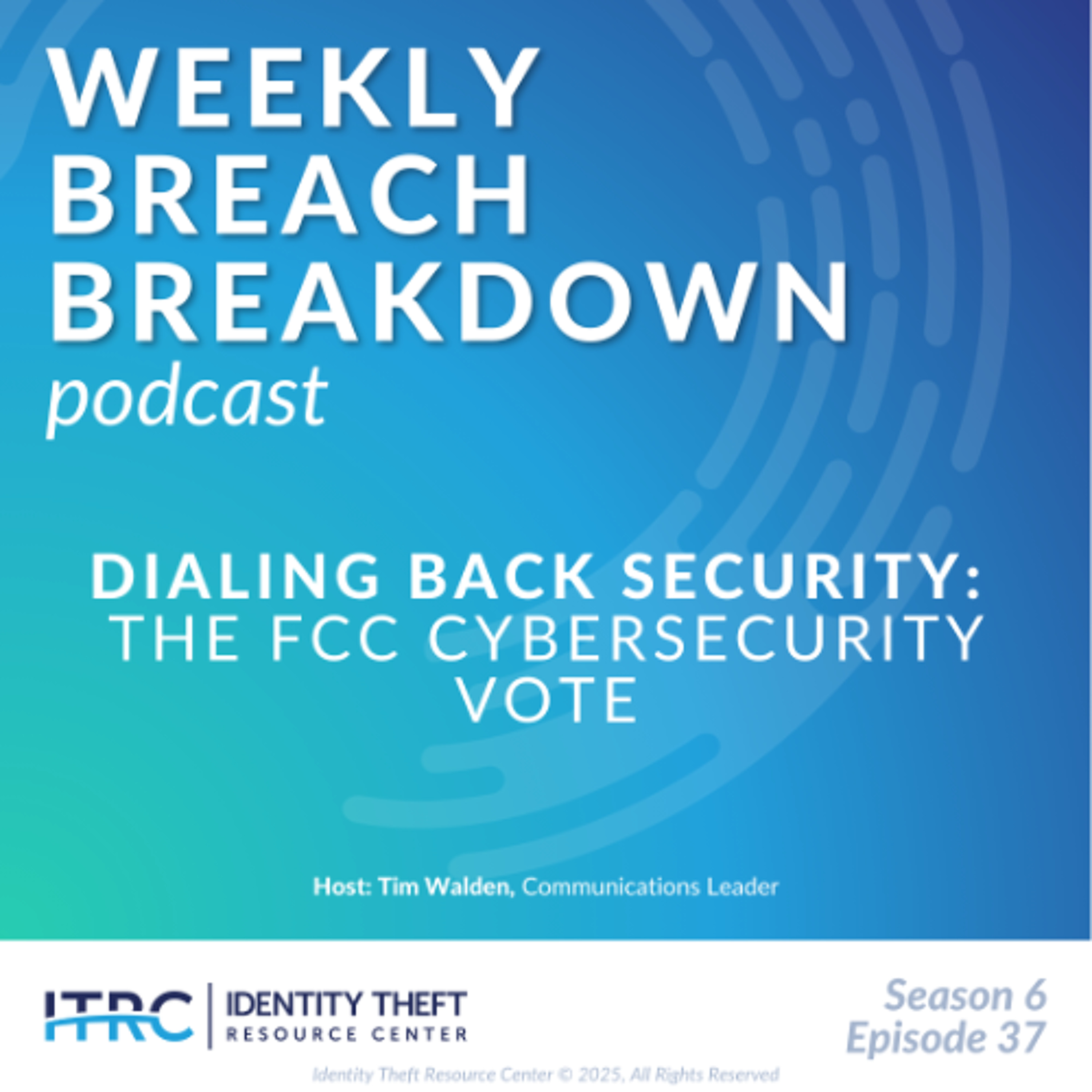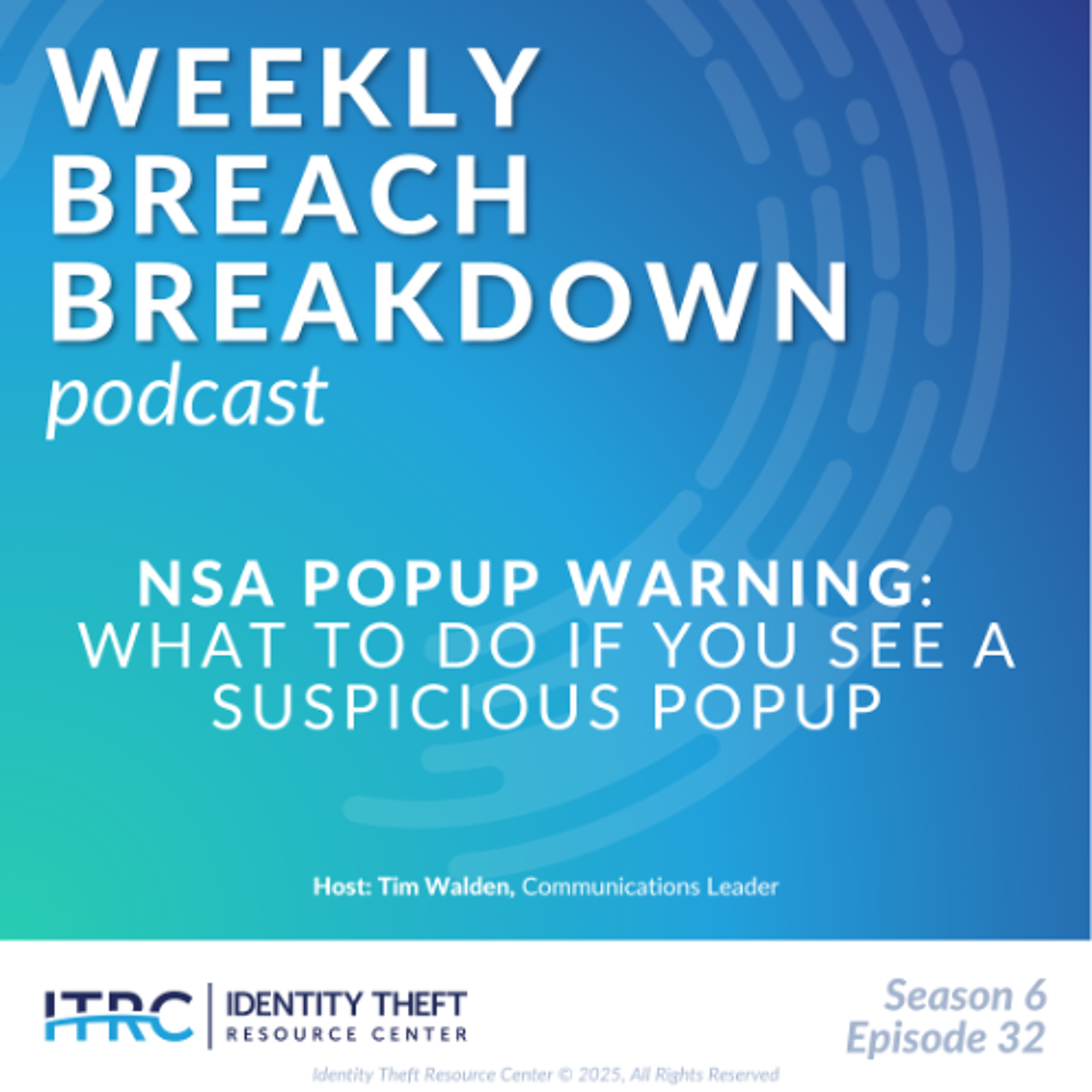Each week, we look at the most recent events and trends related to data security and privacy. Today we’re talking about a serious NSA Popup Warning affecting iPhone and Android users. If you see certain popups on your phone, don’t just swipe away, they could be malicious.
Show Notes
Follow on LinkedIn: www.linkedin.com/company/idtheftcenter/
Follow on X: twitter.com/IDTheftCenter
Show Transcript
Welcome to the Identity Theft Resource Center’s (ITRC’s) Weekly Breach Breakdown for October 17, 2025. I’m Tim Walden, Communications Leader for the ITRC. Thanks to Sentilink for supporting the ITRC and this podcast. Each week, we look at the most recent events and trends related to data security and privacy. Today we’re talking about a serious NSA Popup Warning affecting iPhone and Android users. If you see certain popups on your phone, don’t just swipe away, they could be malicious.
A new type of attack has been spreading fast. On PCs, it’s called ClickFix—popups disguised as captchas or technical errors that trick users into running scripts that install malware. Macs can be hit, too, but the big takeaway is that smartphones aren’t safe either.
Even a normal-looking popup on your phone can be dangerous. That’s why the NSA recommends blocking popups in your browser and staying alert for anything unexpected. The NSA popup warning serves as a reminder that attackers often disguise their scams as system messages or software updates.
So, what should you do if a suspicious popup shows up? Here’s the NSA’s advice:
Forcibly close all apps immediately. This clears any running programs and often stops the attack.
Restart your device. A fresh start can wipe out lingering malicious processes.
If you’ve already entered passwords or payment info, take extra steps:
Change the passwords you entered.
Contact your bank if you shared any financial information.
Run a trusted antivirus or security scan.
The NSA popup warning isn’t just about one incident; it’s part of a larger trend in mobile security. The NSA’s advice has stayed consistent over the years. Here’s how to protect yourself for the long term:
Keep your OS and apps updated.
Only install apps from official stores.
Disable location services unless you need them.
Avoid clicking on links or attachments from unknown sources.
Restart your phone regularly to reduce risk from phishing attacks and zero-day exploits.
Tech companies like Apple, Google, Samsung and Meta are warning users that attacks are underway, so don’t wait! Restart your device now and stay vigilant.
If you want to learn more about protecting your information from scammers, or if you believe you’ve been the victim of identity theft, fraud or a scam, the ITRC is here to help. You can speak with one of our expert advisors by phone or text, chat live on our website or send us an email during our normal business hours, 6 a.m. to 5 p.m. Pacific Time. Just visit www.idtheftcenter.org to get started.
Thanks again to SentiLink for their support of the ITRC and this podcast. Please like this episode and subscribe wherever you listen. We’ll be back next week with another edition of the Weekly Breach Breakdown. I’m Tim Walden. Until then, thanks for listening.
Listen On
Also In Season 6
-

The Fraudian Slip Podcast: Gen – ITRC Predictions for 2026 - S6E12
Welcome to the Fraudian Slip, the Identity Theft Resource Center’s (ITRC’s) podc -

The Fraudian Slip Podcast: Identity Theft Resource Center - 2025 Business Impact Report - S6E11
Welcome to the Fraudian Slip, the Identity Theft Resource Center’s (ITRC’s) podc -

The Weekly Breach Breakdown Podcast: Dialing Back Security – The FCC Cybersecurity Vote - S6E37
Welcome to the Identity Theft Resource Center’s (ITRC’s) Weekly Breach Breakdown -

The Weekly Breach Breakdown Podcast: A(I) House of Cards – ChatGPT Issues Impact Users - S6E36
Welcome to the Identity Theft Resource Center's Weekly Breach Breakdown for Nove
